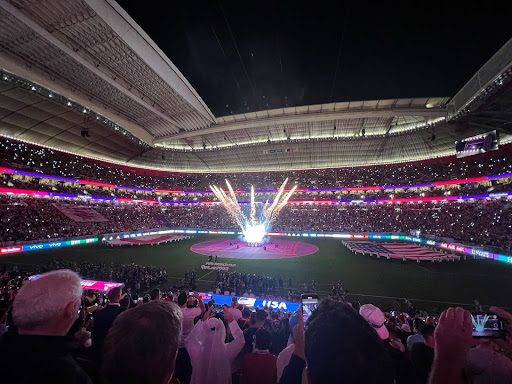Sports meet politics at the 2022 World Cup

December 9, 2022
The biggest sports tournament in the world, the FIFA World Cup, is a 32 team tournament to crown the king of nations in the footballing world. An event I was lucky enough to experience this November.
Before it could even kick off, the decision to hold the 2022 World Cup in Doha, Qatar was shrouded in controversy.
Some countries, including the United States, who were the favorites to host the World Cup in 2022, claimed that bribes were paid so that Qatar could win the bid and host the tournament.
FIFA, which has been riddled with bribery scandals throughout the years, immediately came under fire. There were several reasons why Qatar, a country the size of Connecticut, was a curious choice to host a huge international event.
The first glaring issue was weather.
In the summer, Qatar can reach temperatures of up to 120 degrees Fahrenheit, so FIFA moved the tournament to November, when the weather in Qatar would be much cooler, acting as though this was an insignificant change that did not affect the tournament at all.
This change caused a lot of controversy for players as club teams had to put a hold to their season. This also caused players to have a quick turnaround from their club season to the World Cup, which resulted in many players being forced out with injuries.
In Qatar, I was able to watch soccer games all day. Even when I was not going to watch one at the stadium, it gave the real World Cup experience that you normally feel. However, being back in America and having games played during school has made the World Cup much more difficult to watch and truly experience.
Yet, this change in viewing experience barely scratches the surface of why this World Cup should not have been held in Qatar.
Qatar is the home to numerous human rights violations that affected the perception of safety at the tournament.
Members of the LGBTQ+ community were especially worried about being able to represent their country at the world cup because being homosexual is illegal in Qatar under Islamic law.
LGBTQ+ rights have not become a problem in any way up to this point in the World Cup, which bodes well for the way Qatar is viewed. However, it does not take away from the fact that this is only because tourists are still there, and when they are gone everything will go back to the way it was.
More than anything else however, Qatar’s infrastructure is the main reason they should not have hosted the World Cup.
Before the World Cup there was one stadium in Doha. They needed at least eight stadiums to host the event.
Qatar needed more workers to build those stadiums and a ton of new hotels to hold the millions of people that were coming to Doha, which they were very underprepared for.
They went out and found migrant workers from neighboring countries because they did not have the ability to build it themselves.
Shockingly, near the start of the tournament, it came out that as much as 6,5000 migrant workers died due to horrible work conditions building these stadiums. Even on a smaller scale, the amount of workers brought in to work from outside the country created many problems.
Many workers such as Uber drivers were brought to Qatar to just help people get to and from games and did not know the city at all. Many did not even have cell service or data meaning because they weren’t from there so they couldn’t even look up locations on their phone.
In the end, this World Cup has gone relatively well given that there have been little to no reported issues in Qatar.
Personally, my experience in Qatar was definitely a positive one, and the environment for the World Cup was incredible. However, it does not mean that the highly anticipated tournament should have been hosted there.
Qatar was underprepared to host the biggest sports tournament in the world and the irresponsibility from FIFA, whether it was due to corruption, negligence, or anything else, cost hundreds of people their lives.
That is a steep price to pay.






